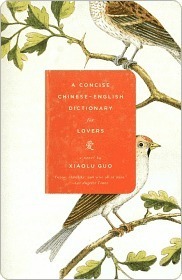What do you think?
Rate this book


306 pages, Kindle Edition
First published March 27, 2007


It's the heart afraid of breaking that never learns to dance.
I am alien, like Hollywood film Alien, I live in another planet, with funny looking and strange language.
English words made only from twenty-six characters? Are English a bit lazy or what? We have fifty thousand characters in Chinese.
Chinese we starting sentence from concept of time or place ... so time and space always bigger than little human in our country.
I am always alone, talking in my notebook, or wandering here and there like invisible ghost.
Maybe I want find man can love me. A man in this country save me, take me, adopt me, be my family, be my home.
'Love', this English word: like other English words it has tense. 'Loved' or 'will love' or 'have loved'. All these tenses mean Love is time-limited thing. Not infinite. It only exist in particular period of time. In Chinese, love is '爱' (ai). It has no tense. No past and future. Love in Chinese means a being, a situation, a circumstance. Love is existence, holding past and future.
Blurb: When a young Chinese woman, newly arrived in London, moves in with her English boyfriend, she decides it’s time to write a Chinese-English dictionary for lovers. Xiaolu’s first novel in English is an utterly original journey of self-discovery.Bland.
One thing, even Shakespeare write bad English. For example, he says “Where go thou?” If I speak like that Mrs. Margaret will tell me wrongly. Also I finding poem of him call “An Outcry Upon Opportunity”: ’Tis thou that execut’st the traitor’s treason; Thou sett’st the wolf where he the lamb may get I not understanding at all. What this “’tis,” “execut’st” and “sett’st”? Shakespeare can writing that, my spelling not too bad then.Twenty-four-year-old Ms.Z travels from a small town/village in China to England to study English. Her parents expect of her to sell their shoes from their family-owned factory to the British and she needs to learn the language properly. She meets a man, twenty years her senior, with whom she starts a relationship.

‘Love’, this English word: like other English words it has tense. 'Loved' or 'will love' or 'have loved'. All these tenses mean Love is time-limited thing. Not infinite. It only exist in particular period of time. In Chinese, love is '爱' (ai). It has no tense. No past and future. Love in Chinese means a being, a situation, a circumstance. Love is existence, holding past and future.